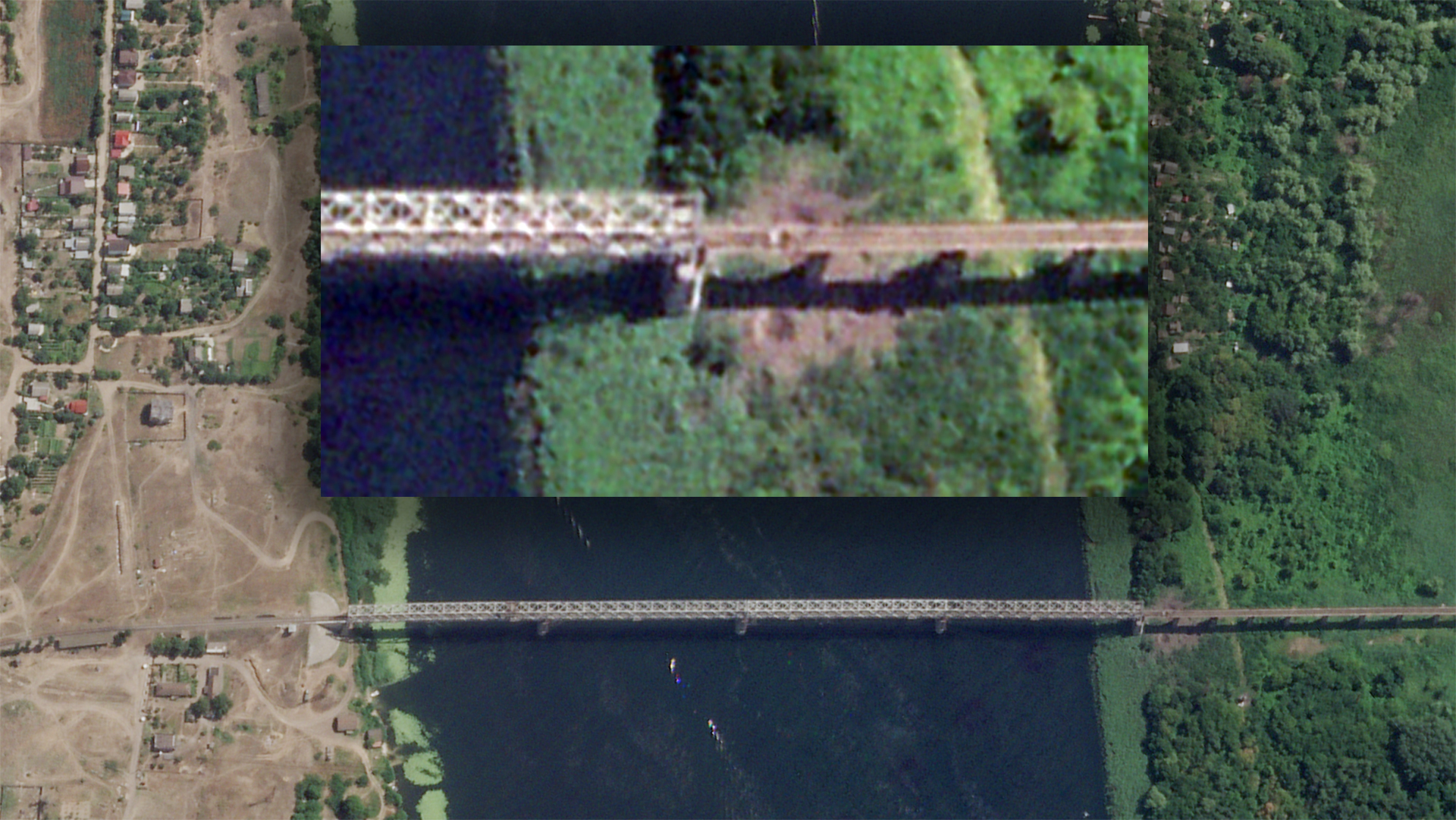The legend of U.S.-supplied M142 HIMARS and its rockets grew again this week as a Ukrainian strike knocked out the Antonivskiy Railway Bridge over the Dnipro River.
Strikes earlier this week took out the Antonovskiy Bridge, which carries the E97 Highway over the river just a few miles downstream of the railway crossing. The two bridges near Kherson, as well as the dam at Nova Kakhovka upriver, are vital supply links to Russian forces across the river.
Unfortunately for the Russians, they are known, fixed targets in HIMARS range. As such, the life expectancy on those targets, like Russian ammo dumps, isn’t great. High-resolution satellite imagery from Planet Labs shows damage to the bridge on the river’s south bank from July 28.

With the highway bridge out, Russians are ferrying vehicles and equipment across the road bridge with a predictable bottleneck result for anyone trying to cross. At the railway bridge, radar satellite imagery shows what appears to be a pontoon bridge in use, while previous imagery may have caught one stowed in a nearby river side channel.
Crippling these supply lines can’t bode well for Russian forces north of the Dnipro, who are already defending against a continued Ukrainian counteroffensive in the region. The War Zone readers can get caught up on that effort and other reports from the war in Ukraine in our previous rolling coverage here.
The Latest
Today’s update from the British Ministry of Defense confirms reports on the Kherson bridges and refers to a series of failed Russian attacks near Donetsk.
While Russian forces have advanced elsewhere in the region and throughout the broader Donbas, the Donetsk frontline has held. These are the same fortified positions, trenches, and bombed-out villages down the city’s western edge that Ukrainian and pro-Russian separatists have fought along since 2014.
Direct assaults on those positions, where defenders have had years to dial in distances and set up kill zones, would require serious fire support and probably still lead to significant casualties.
This week also saw two disturbing accounts regarding Ukrainian prisoners of war. Videos and reports appeared Thursday on pro-Russian Telegram accounts showing Russian soldiers castrating a Ukrainian POW and later executing him.
The videos have been largely removed from Twitter after appearing in Russian state media, but Aric Toler with investigative journalism site Bellingcat published a detailed thread linking the man in the video, shown with a distinctive black cowboy hat, to videos at the Azot chemical plant in Severodonetsk in late June.
Then came reports Friday that more than 50 Ukrainian POWs died in a prison building in the village of Olenivka, south of Donetsk. A spokeswoman for the separatist, Russian-backed Donetsk People’s Republic claimed the barracks destroyed housed POWs from the Azov Battalion captured after the siege of Azovstal in Mariupol.
Reuters journalists visited the prison and showed some of the graphic damage. Russia has since claimed amid widespread condemnation that a Ukrainian HIMARS targeted the prison. Despite denying its involvement, the Russian Embassy in the United Kingdom tweeted that members of Azov should be executed and “deserve a humiliating death.”
The Security Service of Ukraine posted a video on YouTube of an intercepted phone call in which two Russian soldiers discuss a false-flag attack on the prison. We are unable to independently confirm the accuracy of the video.

All this and more, dating back to massacres in the occupied town of Bucha in March, have many calling for Russia to be designated as a terrorist state, a step the White House is feeling more pressure on with this week’s atrocities.
As more details emerge from the war’s chaotic first hours and days, there’s an incredible story from Reuters on how Russia infiltrated Ukraine with spies and collaborators before its February 24 invasion began, namely involving the fall of the Chernobyl nuclear power plant and its irradiated exclusion zone north of Kyiv. It is well worth the read and indicative of how much groundwork went into the planning of Russia’s invasion.
Lastly, there’s new footage of Ukrainian forces putting two powerful long-range artillery systems to use: the 203mm 2S7 Pion and former British Army M270 Multiple Launch Rocket Systems.
Update: 9:00 p.m. E.T.
Satellite imagery from Maxar Technologies shows a number of open graves at the Olenivka prison on July 27, two days before an explosion that killed more than 50 Ukrainian POWs housed in a barracks there. A subsequent image from July 29 with the barracks in ruin shows those graves covered. The appearance of graves two days before a mass-casualty event at the prison may point to something much more sinister than Russia’s original claim of a Ukrainian HIMARS strike.


We will continue to update this story until we state otherwise.
Contact the author: stetson.payne@thewarzone.com

